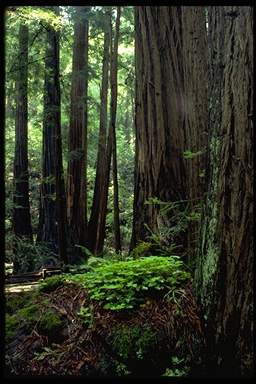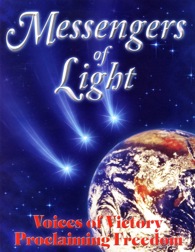The First Angel Proclaims . . .

" ... and worship Him who made the heavens, and the earth, and the seas and the fountains of waters." óRevelation 14:7
The temple of God was opened in heaven, and there was seen in His temple the ark of His testament" (Revelation 11:19). This announcement points to the opening of the most holy place of the heavenly sanctuary in 1844 as Christ entered there to perform the closing work of the atonement, in which He continues to plead His blood for sinners and conduct His judgment.
The ark in the tabernacle on earth contained the two tables of stone, upon which were inscribed the Ten Commandments. Within the holy of holies, in the sanctuary in heaven; the divine law is sacredly enshrined the law which God Himself spoke amid the thunders of Sinai and wrote with His own finger on the tables of stone.
God's law in the sanctuary above is the great original, of which the precepts inscribed upon the tables of stone and recorded by Moses in the Pentateuch were an unerring transcript. Christ declared, "Till heaven and earth pass, one lot or one tittle shall in no wise pass from the law" (Matthew 5:18). The law of God, being a transcript of His character, must forever endure, "as a faithful witness in heaven. Not one command has been annulled; not a jot or a tittle has been changed. "Forever, O Lord, Thy word is settled in heaven." "All His commandments are sure. They stand fast for ever and ever" (Psalms 119:89; 1l1:7, 8).
In the very bosom of the Decalogue is the fourth commandment, as it was first proclaimed: "Remember the sabbath day, to keep it holy. Six days shalt thou labor, and do all thy work: but the seventh day is the Sabbath of the Lord thy God: in it thou shalt not do any work, thou, nor thy son, nor thy daughter, thy manservant, nor thy maidservant, nor thy cattle, nor thy stranger that is within thy gates: for in six days the Lord made heaven and earth, the sea, and all that in them is, and rested the seventh day: wherefore the Lord blessed the Sabbath day, and hallowed it" (Exodus 20:8-11).
God's Spirit impressed on the hearts of earnest Bible students who had grasped the sanctuary truth that they had ignorantly transgressed this precept by disregarding the Creator's rest day. As they examined the reasons for observing the first day of the week instead of the day which God had sanctified, they could find no Bible evidence that the fourth commandment had been abolished, or that the Sabbath had been changed; the blessing which first hallowed the seventh day had never been removed. They had been honestly seeking to know God's will; now, as they saw themselves transgressors of His law, they repented and manifested their loyalty to God by keeping His Sabbath holy.
Strenuous efforts were made to overthrow their faith. None could fail to see that if the earthly sanctuary was a figure or pattern of the heavenly, the law deposited in the ark on earth was an exact transcript of the law in the ark in heaven; and that an acceptance of the truth concerning the heavenly sanctuary involved an acknowledgment of the claims of God's law and the obligation of the Sabbath of the fourth commandment. Here was the secret of the bitter and determined opposition to the harmonious exposition of the Scriptures that revealed the ministration of Christ in the heavenly sanctuary. Men sought to close the door which God had opened, and to open the door which He had closed. But "He that openeth, and no man shutteth; and shutteth, and no man openeth," had declared: "Behold, I Have set before thee an open door, and no man can shut it" (Revelation 3:7, 8). Christ had opened the door, or ministration, of the most holy place; light was shining from that open door of the sanctuary in heaven, and the fourth commandment was shown to be included in the law which is there enshrined
Those who had accepted the light concerning the mediation of Christ and the perpetuity of the law of God found that these were the truths presented in Revelation 14:6-12 -- a threefold message designed to prepare the world for the Lord's second coming. The announcement, "The hour of His judgment is come," points to the closing work of Christ's ministration for the salvation of men. It heralds a truth which must be proclaimed until the Savior's intercession shall cease and He shall return to the earth to take His people to Himself. The work of judgment which began in 1844 must continue until the cases of all are decided, both of the living and the dead; hence it will extend to the close of human probation. That men may be prepared to stand in the judgment, the first angel's message commands them to "fear God, and give glory to Him," and worship the Creator of heaven, and earth. In order to do this, we must obey His law. The result of accepting this message is given in the Word: "Here are they that keep the commandments of God, and the faith of Jesus." Says the wise man: "Fear God, and keep His commandments: for this is the whole duty of man" (Ecclesiastes 12:13). Without obedience to His commandments no worship can be pleasing to God. "This is the love of God, that we keep His commandments." "He that turneth away his ear from hearing the law, even his prayer shall be abomination" (1 John 5:3; Proverbs 28:9).
Scripture cites God's creative power as the reason to reverence and worship Him. "All the gods of the nations are idols: but the Lord made the heavens" (Psalm 96:5). "Know ye that the Lord He is God: it is He that hath made us, and not we ourselves." "O come, let us worship and bow down: let us kneel before the Lord our Maker" (Psalms 100:3; 95:6). "Thou art worthy, O Lord, to receive glory and honor and power: for Thou hast created all things" (Revelation 4:11).

Revelation 14 associates worshiping the Creator with the keeping of His commandments, One of which points directly to God as the Creator. The fourth precept declares: "The seventh day is the Sabbath of the Lord thy God: ... for in six days the Lord made heaven and earth, the sea, and all that in them is, and rested the seventh day: wherefore the Lord blessed the Sabbath day, and hallowed it" (Exodus 20:10. 11). Concerning the Sabbath, the Lord says, it is "a sign, ... that ye may know that I am the Lord your God" (Ezekiel 20:20). And the reason given is: "For in six days the Lord made heaven and earth, and on the seventh day He rested, and was refreshed" (Exodus 31:17).
It was to keep the truth of His Creatorship before the minds of men, that God instituted the Sabbath in Eden; thus it is His sign and memorial. Had the Sabbath been universally kept, man's thoughts and affections would have been led to the Creator as the object of reverence and worship, and there would never have been an idolater, an atheist, or an infidel. Sabbath observance is a sign of loyalty to the true God, who "made heaven, and earth, and the sea, and the fountains of waters." It follows that the message which commands men to worship God and keep His commandments will especially call upon them to keep the fourth commandment.
|
